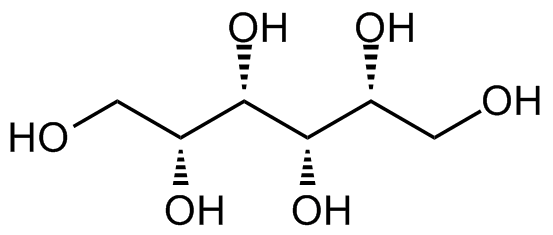
Chemical Structure
Xylitol [87-99-0] [87-99-0]
CDX-X0010
CAS Number87-99-0
Product group Chemicals
Estimated Purity>98%
Molecular Weight152.15
Overview
- SupplierChemodex
- Product NameXylitol [87-99-0] [87-99-0]
- Delivery Days Customer2
- CAS Number87-99-0
- CertificationResearch Use Only
- Estimated Purity>98%
- Molecular FormulaC5H12O5
- Molecular Weight152.15
- Scientific DescriptionChemical. CAS: 87-99-0. Formula: C5H12O5. MW: 152.15. Synthetic. Sugar alcohol used as a sweetener. Unlike other natural or synthetic sweeteners, xylitol is actively beneficial for dental health by reducing caries (cavities) to a third in regular use and helpful to remineralization. Fair evidence was found that xylitol (as chewing gum, lozenges, nasal spray, etc.) reduced the incidence of acute middle ear infection in healthy children. Cavity-causing bacteria prefer six-carbon sugars or disaccharides, while xylitol is non-fermentable and cannot be used as an energy source - while still being taken up into the cell (due to similar shape) and interfering with bacterial growth and reproduction. The harmful micro-organisms are starved in the presence of xylitol, allowing the mouth to remineralize damaged teeth with less interruption. Possessing approximately 33% fewer calories, xylitol is a lower-calorie alternative to table sugar. Proven beneficial in metabolic syndrome patients, including insulin resistance, hypertension, hypercholesterolemia and an increased risk for blood clots. - Sugar alcohol used as a sweetener. Unlike other natural or synthetic sweeteners, xylitol is actively beneficial for dental health by reducing caries (cavities) to a third in regular use and helpful to remineralization. Fair evidence was found that xylitol (as chewing gum, lozenges, nasal spray, etc.) reduced the incidence of acute middle ear infection in healthy children. Cavity-causing bacteria prefer six-carbon sugars or disaccharides, while xylitol is non-fermentable and cannot be used as an energy source - while still being taken up into the cell (due to similar shape) and interfering with bacterial growth and reproduction. The harmful micro-organisms are starved in the presence of xylitol, allowing the mouth to remineralize damaged teeth with less interruption. Possessing approximately 33% fewer calories, xylitol is a lower-calorie alternative to table sugar. Proven beneficial in metabolic syndrome patients, including insulin resistance, hypertension, hypercholesterolemia and an increased risk for blood clots.
- SMILESO[C@@H]([C@@H]([C@H](CO)O)O)CO
- Storage InstructionRT
- UNSPSC12352200



![Xylitol [87-99-0] [87-99-0]](https://www.targetmol.com/group3/M00/03/49/CgoaEGY7TSuEF8lIAAAAAMScy5I179.png)